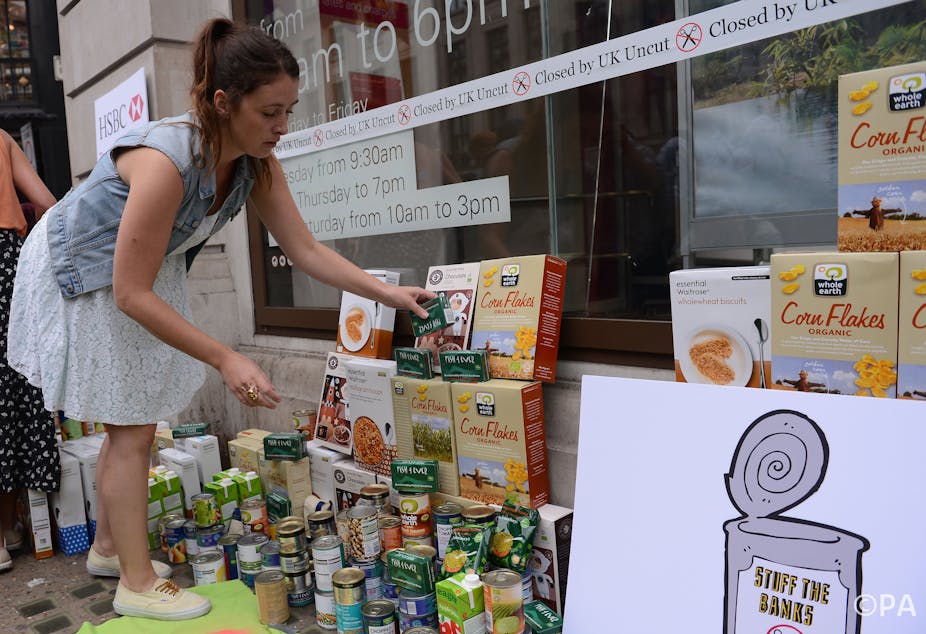Michael Gove’s recent suggestion that inadequate financial management skills among poor families are to blame for the increasing demand on food banks has, unsurprisingly, sparked an angry response. Critics feel the Conservative Party is out of touch with the pressures on ordinary families.
Gove’s comments have been criticised not only by opposing politicians but also in the UK media spanning the left- and right-wing press, and by experts in poverty-related fields. His views on the matter have been widely disparaged as naïve, condescending and ignorant of the realities of life for people on low incomes.
Such reactions are neither surprising nor unwarranted. What is surprising is that this response suggests some revelation about Gove’s or the Coalition’s position in his comments. Similar messages – that the poor are irresponsible, lazy and unskilled in managing their own affairs – are evident throughout Coalition policy and rhetoric. Cameron evokes the same position in reference to “skivers vs strivers”.
Documentation relating to Universal Credit cites intergenerational cycles of worklessness caused by addiction and crime, supported by Louise Casey’s “troubled families” rhetoric. These continue despite a persistent lack of empirical evidence supporting the existence, never mind propagation, of such families in significant numbers.
Similarly, Iain Duncan-Smith’s recent consultation into child poverty measurement has come under a great deal of fire from academics, partially as a result of the stigmatising and uninformed assumptions about causes, effects and correlates of child poverty evident in the consultation documentation.

Political rhetoric is shaped by - and has a role in shaping - popular opinion. While many members of the public were outraged by Gove’s comments, the underlying assumptions and implications are not too different from those evident in popular conceptions of poverty. Representations of poverty in the media often draw on assumptions that “real” poverty does not exist in the UK, or that the poor are responsible for their own suffering.
These views reflect a hardening of public attitudes towards the poor, and popular explanations of poverty which draw more heavily on individual shortcomings than structural causes. Such views, exacerbated by the political rhetoric described above, can then further fuel this rhetoric and resulting policies through the misapplication of data on popular values as if they were data on empirical fact.
The real picture
Turning to the facts, findings from the Poverty and Social Exclusion Research Project, the largest-scale survey of its kind in the UK to date, have recently been published. An increase in the depth and breadth of poverty is revealed.
Twice as many people fell below minimum standards in 2012 as did in 1983. 4% of children and 8% of adults cannot afford to eat properly. Little supporting evidence for the position that poor people are irresponsible and lazy can be found. Where families are short of money, hard-pressed parents sacrifice their own nutritional needs to protect their children. And with regard to Cameron’s “skivers” who make a “lifestyle choice” to claim benefits, embarrassment was found to be a common response to living on a low income (a finding supported in other research).
Furthermore, low income is not so often a result of unemployment as Coalition rhetoric would suggest: evidence on child poverty shows that the majority of poor children live in households containing at least one worker.
That those living on benefits view their lives as a humiliating struggle rather than a free ride is no surprise when the impact of the Coalition’s decision to uprate benefits at a rate of only 1% per year is examined. The following chart shows the real value of unemployment benefit (now JSA), and its value as a proportion of average earnings, since 1948. Whilst the value of benefits in real terms is reasonably stable, the departure from average earnings indicates that the gap between the rich and the poor is ever increasing.

As well as benefits being uprated by less than inflation, reductions in real earnings, the freezing of child benefit, the benefits cap and bedroom tax are further reducing incomes. In addition many poor working age households now have to pay some council tax following the transfer to local authorities.
Poverty, then, is a real and present condition in the UK, it is getting worse, and there is scant evidence that the poor are to blame. Indeed, stigmatising Coalition policies which target the poor have resulted in legal challenges to the proposed benefits cap and bedroom tax. The UN special rapporteur on housing has gone so far as to dub the bedroom tax a breach of human rights.
It is hardly news that harsh popular and governmental responses to the poor and to poverty clash with empirical evidence. Similar themes can be found, for example, in Mayhew’s investigations of poverty and the poor laws in the 1850s.
But it could be reasonably expected that policy would have moved on since those times. Politicians work within an electoral system which requires popular support, and this will inevitably impact rhetoric and policy, but this is not an adequate excuse for ignoring evidence and propagating damaging and stigmatising perceptions.
Academics must do better at communicating findings in a way that is accessible to the wider public, but politicians bear the responsibility for making informed policy decisions based on sound evidence rather than prejudice.

